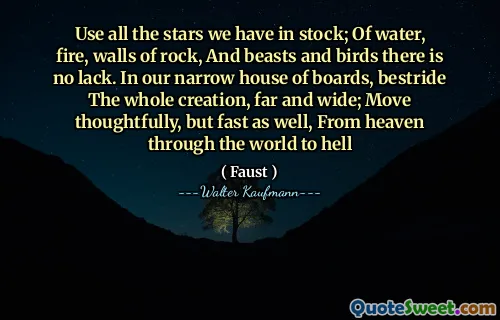Walter Kaufmann was a significant philosopher, historian, and translator known for his work in existentialism and religious thought. Born in 1921, he emerged as an influential figure in the mid-20th century, particularly recognized for his interpretations of existentialist thinkers like Nietzsche and Kierkegaard. Kaufmann's approach to philosophy often emphasized the importance of personal authenticity and the individual's experience in an increasingly complex world. Throughout his career, Kaufmann published several notable works that challenged traditional views on religion and morality. He argued for a more nuanced understanding of faith, suggesting that belief should not be confined to dogma but rather embraced as a personal journey. His translations of philosophical texts also helped bridge the gap between European thought and American intellectual life, making complex ideas more accessible. Kaufmann was not only a thinker but also a passionate educator, inspiring students through his teaching at Princeton University. His emphasis on critical thinking and open inquiry left a lasting impact on generations of scholars. Despite his challenging ideas, Kaufmann remains a pivotal figure in philosophical discussions surrounding existence, meaning, and the human condition.
Walter Kaufmann was a significant philosopher, historian, and translator known for his work in existentialism and religious thought. Born in 1921, he emerged as an influential figure in the mid-20th century, particularly recognized for his interpretations of existentialist thinkers like Nietzsche and Kierkegaard. Kaufmann's approach to philosophy often emphasized the importance of personal authenticity and the individual's experience in an increasingly complex world.
Throughout his career, Kaufmann published several notable works that challenged traditional views on religion and morality. He argued for a more nuanced understanding of faith, suggesting that belief should not be confined to dogma but rather embraced as a personal journey. His translations of philosophical texts also helped bridge the gap between European thought and American intellectual life, making complex ideas more accessible.
Kaufmann was not only a thinker but also a passionate educator, inspiring students through his teaching at Princeton University. His emphasis on critical thinking and open inquiry left a lasting impact on generations of scholars. Despite his challenging ideas, Kaufmann remains a pivotal figure in philosophical discussions surrounding existence, meaning, and the human condition.
More »
Today Birthdays
1729 -
Edmund Burke
1949 -
Haruki Murakami
1954 -
Howard Stern
1876 -
Jack London
1993 -
Zayn Malik
1951 -
Kirstie Alley
1863 -
Swami Vivekananda
1923 -
Alice Miller
1987 -
Naya Rivera
1825 -
Brooke Foss Westcott
1944 -
Joe Frazier
1951 -
Rush Limbaugh
1964 -
Jeff Bezos
1978 -
Jeremy Camp
1628 -
Charles Perrault
1856 -
John Singer Sargent
1970 -
Kaja Foglio
1953 -
Rick Santelli
1986 -
Gemma Arterton
1968 -
Raf Simons
1958 -
Christiane Amanpour
1966 -
Olivier Martinez
1996 -
Ella Henderson
1917 -
Maharishi Mahesh Yogi
1949 -
Ottmar Hitzfeld
1928 -
Ruth Brown
1968 -
Heather Mills
1946 -
George Duke
1968 -
Rachael Harris
1923 -
Ira Hayes

